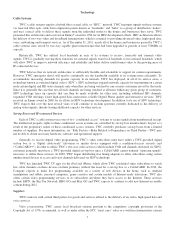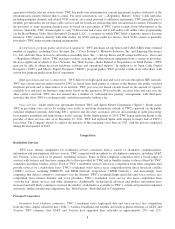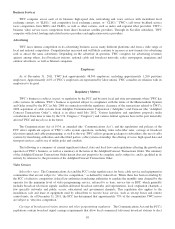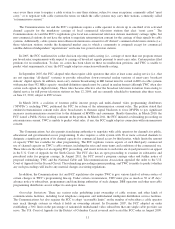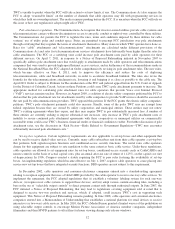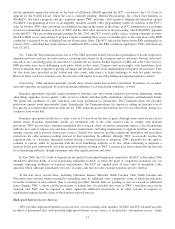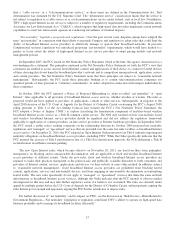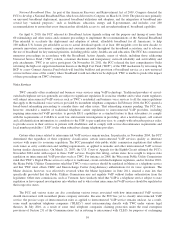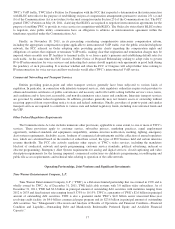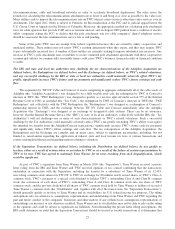Time Warner Cable 2011 Annual Report Download - page 23
Download and view the complete annual report
Please find page 23 of the 2011 Time Warner Cable annual report below. You can navigate through the pages in the report by either clicking on the pages listed below, or by using the keyword search tool below to find specific information within the annual report.than a “cable service” or a “telecommunications service,” as those terms are defined in the Communications Act. That
determination was sustained by the U.S. Supreme Court. The “information service” classification means that the service is
not subject to regulation as a cable service or as a telecommunications service under federal, state or local law. Nonetheless,
TWC’s high-speed Internet access service is subject to a number of regulatory requirements, including the Communications
Assistance for Law Enforcement Act (“CALEA”), which requires that high-speed data providers implement certain network
capabilities to assist law enforcement agencies in conducting surveillance of criminal suspects.
“Net neutrality” legislative proposals and regulations. Over the past several years, disparate groups have adopted the
term “net neutrality” in connection with their efforts to persuade Congress and regulators to adopt rules that could limit the
ability of broadband Internet access providers to effectively manage or operate their broadband networks. In previous
Congressional sessions, legislation was introduced proposing “net neutrality” requirements, which would have limited to a
greater or lesser extent the ability of high-speed Internet access service providers to adopt pricing models and network
management policies.
In September 2005, the FCC issued its Net Neutrality Policy Statement, which at the time, the agency characterized as a
non-binding policy statement. The principles contained in the Net Neutrality Policy Statement set forth the FCC’s view that
consumers are entitled to access and use lawful Internet content and applications of their choice, to connect to lawful devices
of their choosing that do not harm the broadband provider’s network and to competition among network, application, service
and content providers. The Net Neutrality Policy Statement notes that these principles are subject to “reasonable network
management.” Subsequently, the FCC made these principles binding as to certain telecommunications companies for
specified periods of time pursuant to “voluntary commitments” in orders adopted in connection with mergers undertaken by
those companies.
In October 2009, the FCC initiated a Notice of Proposed Rulemaking to adopt so-called “net neutrality” or “open
Internet” rules applicable to all providers of broadband Internet access services, whether wireline or wireless. The rules as
proposed would not have applied to providers of applications, content or other services. Subsequently, in response to the
April 2010 decision of the U.S. Court of Appeals for the District of Columbia Circuit overturning the FCC’s August 2008
ruling pursuant to Title I of the Act finding Comcast had violated the FCC’s Net Neutrality Policy Statement, the
FCC adopted a Notice of Inquiry (“NOI”) to explore classifying the transmission component of facilities-based wireline
broadband Internet access service as a Title II common carrier service. The NOI only touched on how non-facilities based
and wireless broadband Internet service providers should be regulated and did not address the regulatory framework
applicable to application or content providers, on-line service providers or Internet backbone providers. In September 2010,
the FCC issued a public notice seeking comments on the relationship between its October 2009 proposed net neutrality
regulations and “managed” or “specialized” services that are provided over the same last-mile facilities as broadband Internet
access service. On December 21, 2010, the FCC adopted an Open Internet Order pursuant to its Title I authority imposing net
neutrality obligations on broadband Internet access providers, including TWC. While the Order specifically indicates that the
FCC pursued the exercise of Title I jurisdiction in lieu of a Title II reclassification approach, the NOI addressing a Title II
reclassification nevertheless remains pending.
The new Open Internet rules, which became effective on November 20, 2011, are based on three basic principles:
transparency, no blocking and no unreasonable discrimination, and are applicable to fixed and wireless broadband Internet
access providers to different extents. Under the new rules, fixed and wireless broadband Internet access providers are
required to make their practices transparent at the point-of-sale and publically available thereafter to both consumers and
providers of Internet content, services, applications and devices via their website or some other method. In addition, subject
to “reasonable network management,” fixed broadband Internet access providers are prohibited from blocking lawful
content, applications, services and non-harmful devices, and from engaging in unreasonable discrimination in transmitting
lawful traffic. The new rules specifically do not apply to “managed” or “specialized” services that share the same network
infrastructure as broadband Internet access services, although the Order indicates that the FCC intends to observe market
developments in this area and may take further regulatory action if it believes it is warranted. The rules are currently under
appeal by multiple parties before the U.S. Court of Appeals for the District of Columbia Circuit, with proponents arguing the
rules did not go far enough and opponents arguing the FCC had no jurisdiction to impose rules.
For further discussion of “net neutrality” and its impact on TWC, see the discussion in “Risk Factors—Risks Related to
Government Regulation—‘Net neutrality’ legislation or regulation could limit TWC’s ability to operate its high-speed data
business profitably and to manage its broadband facilities efficiently.”
15




